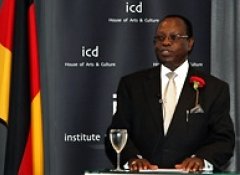News from Berlin
A Lecture by H.E. Amb. Canon Francis Butagira, Ambassador of the Republic of Uganda to Germany
July 14th, 2011
H.E. Amb. Canon Francis Butagira
Ambassador of the Republic of Uganda to Germany
News from Berlin. H.E. Ambassador Canon Francis Butagira is a Uganda diplomat and lawyer, who is active in the international political community. H.E. Butagira studied law at the University of Dar es Salaam and the School of Oriental and African Studies, and graduated Harvard University with a Master of Laws degree. Prior to his diplomatic career, he worked as a judge for the High Court and as the Chief Magistrate of Mbarara, Uganda as well as lecturing in law.
He entered the world of politics when he served the president on the European Economic Committee Assembly and the African, Caribbean and Pacific Group of States, followed by a position as the speaker of the Parliament between 1980 and 1985. He then became the Chairman of the Legal and Security Affairs Committee in the National Assembly of Uganda between 1989 and 1996. In 1998 he was appointed the Ambassador of Uganda to Ethiopia and a permanent representative to the Organization of African Unity (OAU). He later served as a representative for the UN Environment Programme in Nairobi and a permanent representative to the United Nations beginning in 2003. In 2010, H.E. Butagira was appointed Ambassador of Uganda to Germany.
Berlin Global
News from Berlin
“Uganda’s Transformation and its Relationship to East African Integration and African Union”
A Lecture by H.E. Amb. Canon Francis Butagira Ambassador of the Republic of Uganda to Germany
The International Symposium on Cultural Diplomacy in Africa
(Berlin; July 14th, 2013)
An Interview with H.E. Amb. Canon Francis Butagira Ambassador of the Republic of Uganda to Germany
11.03.2011 – Interview conducted by Ashley S. Fitzpatrick
Q1. What do you see as the largest obstacle in Uganda for the entry of international investors?
I think that’s been the lack of information for and knowledge by potential investors from Western countries about Uganda. I think that that’s the main obstacle. But otherwise, for a country like ours, we have put in place all that it takes to attract foreign investment: good legal regime, incentives, a liberalized economy, a repatriation of profits and allowances, etc. All these packages are there. But we have to market and our country has to be known because only then they can see the potential of our country.
Q2. Uganda has recently rebranded itself as “Gifted by Nature”. Could you elaborate more on your thoughts on nation branding? It seems that countries over the years have to rebrand and reinvent themselves, perhaps as a result of globalization. But it seems like it is not a static identity. Can you reflect a bit further on that?
The branding “Gifted by Nature” is really a good summary of what our country is. It has much natural beauty. It is a small country but you can find some attractions which are not elsewhere. For instance, this country is ever green since it’s on the equator. It has a mild climate, no hot summers, no rainy season and it is just mild and green throughout the year. So this is one of the things that strikes people when they are coming to Uganda. Then there are the lakes such as Lake Victoria, which is the second biggest freshwater lake in the world. A big part of it is in our country. Then there are the rare animals such as gorillas. In the wild now there are only about 700 left. And there are 500 in Uganda, which is a big attraction.
Q3. Over the last couple days there has been a recurring theme of the role of youth and young people in today’s globalized world. What special role can the young people in Uganda play in terms of tourism and the national brand?
We place a high priority on the youth. They are now being empowered to take part in small-scale industries and we have programs to give them skills to better understand the world. They are participating in the tourism, especially community-based, which is the best kind of tourism. And as you know, we have the skill whereby all the receipts from the tourism in a particular area go back into the community. This helps with the roads, the small things and the involvement of the village. And we need very active participants in this exercise.




